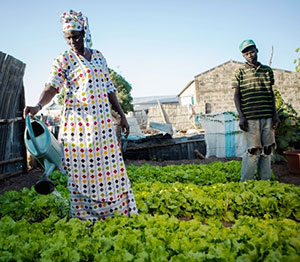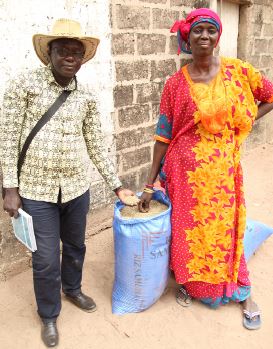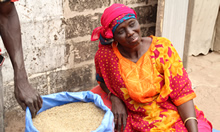How Multi-Sectoral Nutrition Benefits the Whole Household

Family Nutrition Rooted in the Garden
In the Thiaré Department of Senegal’s Kaolack region, eating a healthy, varied diet can be expensive. As Thiane Dramé’s family grew, so did the challenges to providing the food and health care they needed. “I just knew that because life is so expensive and our economic situation in this area is hard, that I would have to do something to make our life better,” said Thiane. To tackle the problem, she decided that she would have to learn to cultivate her own fruits and vegetables.
Soon after buying and planting her first seeds, Thiane’s farmer co-op referred her to SPRING/Senegal. The SPRING project takes a multisectoral approach to improving maternal and child nutrition in three regions in Senegal by supporting nutrition-sensitive agriculture, dietary diversity and feeding practices, good hygiene, and balanced gender roles in households.
I was very lucky to find out about SPRING just days after starting my garden. The SPRING coordinators are always there to help and have changed everything for us.
--Thiane Dramé, grandmother and community nutrition champion
Planting for Nutrition
SPRING’s agriculture team showed Thiane techniques to help her plants grow and provided seeds for additional nutritious crops like carrot and cowpeas, and cuttings for orange-fleshed sweet potato, which is rich in vitamin A. “My youngest grandchild was always sick,” said Thiane. “As soon as I learned that orange-fleshed sweet potato is a nutritious crop for preventing anemia in pregnant women, improving mothers’ breastmilk, and ensuring children grow up healthy, I didn’t hesitate [to plant it].”
Nutrition beyond Food

As a grandmother, Thiane enlisted the support of the entire family in tending to her garden. She explained, “My oldest son helps me. The teenagers have taken over pumping water for the plants. My husband gave me a half hectare to plant biofortified millet and he makes sure everyone helps me...so it doesn’t take very much time.” Thiane knew that a diverse diet was important to her family’s nutrition, but after learning from SPRING how important a clean household and good hygiene are to keeping everyone healthy, Thiane also installed three tippy-taps. “Now I always wash my hands with soap and water. So does my family. And my neighbors also built [tippy-taps] to use,” said Thiane.
The Cup Overflows
Thanks to the changes Thiane and her family have made, she has reaped benefits she never expected. “My youngest grandson doesn’t fall sick as much now, so we don’t have medical bills like before,” she said. Combined with income from the shared chicken coop SPRING helped her women’s group install, the earnings from the garden also allow the family to regularly purchase a variety of fruits and vegetables, biofortified millet and corn, veal, eggs, and fish.
Not only does Thiane share her harvest with her neighbors, but she and her family are sharing what they’ve learned about nutrition so that neighbors can start their own gardens and build more tippy-taps. “In my community, all the women have started their own gardens and even beyond them, I invite other women to do the same,” she said. “[SPRING] coordinators are always there to help and they have changed everything for us. I hope they will continue to support us because these things are the key to good nutrition and the health of the entire family."
Since 2016, SPRING/Senegal has worked through a multi-sectoral network of partners, using trainings, community video and radio, and community events to encourage use of high-impact behaviors to improve nutrition among pregnant and lactating women and children under two.
